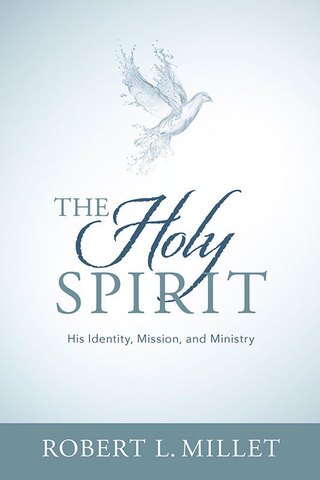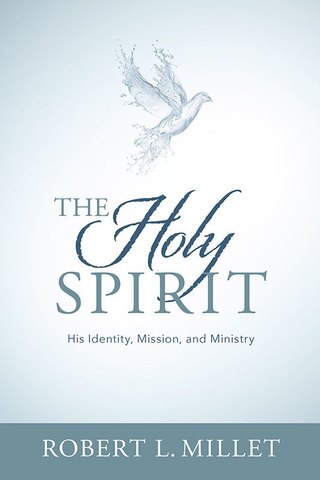What do we understand about the Personage we know as the Holy Ghost, the third member of the Godhead? Elder Bruce R. McConkie taught: “Prophets and saints in all dispensations have seen the Lord Jesus Christ in both the dreams of the night and the visions of the day, and also face to face as a man looketh upon and speaketh with his friends. Some have even been privileged to see the Father also. But with the Holy Ghost it is otherwise. His voice is heard; his influence is felt; his presence is manifest—but his person is kept hidden from view in all but rare instances.”1
1. The Holy Ghost is a male spirit personage, a spirit son of God the Father.
In a sermon delivered in 1857, President Heber C. Kimball stated: “The Holy Ghost is a man; he is one of the sons of our Father and our God; and he is that man that stood next to Jesus Christ, just as I stand by Brother Brigham.”2
This being is known by such name-titles as the Holy Ghost, the Holy Spirit, the Spirit of God, the Spirit of Truth, the Comforter, the Witness or Testator, Revelator, Sanctifier, Sealer, and the Holy Spirit of Promise. Joseph Smith delivered to the Saints in Ramus, Illinois, significant doctrinal items of instruction on 2 April 1843: “The Father has a body of flesh and bones as tangible as man’s; the Son also; but the Holy Ghost has not a body of flesh and bones, but is a personage of Spirit” (Doctrine and Covenants 130:22).
We may infer, therefore, that he will eventually receive a physical body, like every other son and daughter of the Father who was faithful in the first estate. On 16 June 1844, only nine days before the martyrdom, George Laub, an early member of the Church whose journal is an important contemporary source of some of the teachings of Joseph Smith, recorded that the Prophet Joseph taught that while the Father, Son, and Holy Ghost are one, or agree in one, “the Holy Ghost is yet a spiritual body and waiting to take to himself a body, as the Savior did or as God [the Father] did.”3
2. He has form, shape, and occupies space.
For a time during his grand panoramic vision, Nephi was tutored by the Spirit. He had seen the tree of life and desired to know what it represented, “for I spake unto him as a man speaketh; for I beheld that he was in the form of a man; yet nevertheless I knew that it was the Spirit of the Lord; and he spake unto me as a man speaketh with another” (1 Nephi 11:11). Over the years, persons reading the Book of Mormon have wondered whether “Spirit of the Lord” refers to Jehovah, the premortal Christ, or the Holy Ghost. How would we know? One approach is to read every reference in the Book of Mormon where the phrase “Spirit of the Lord” is used. When we do so, we discover that this title is used about 40 times in the Book of Mormon, and in every case, it is quite clear that the being referenced is the Holy Ghost, or in a few cases, the Light of Christ. Not one of the references seems to apply to Jehovah himself. Elder James E. Talmage stated: “That the Spirit of the Lord is capable of manifesting Himself in the form and figure of man, is indicated by the wonderful interview between the Spirit and Nephi, in which He revealed Himself to the prophet, questioned him concerning his desires and belief, instructed him in the things of God, speaking face to face with the man.”4
Having taught the members of the Church in Ramus, Illinois, that the Holy Ghost does not have a body, as do the first and second members of the Godhead, Joseph added, “Were it not so, the Holy Ghost could not dwell in us” (Doctrine and Covenants 130:22). This statement requires some clarification, for the Holy Ghost, like the Father and the Son, can be in only one place at a time. Or, as President Joseph Fielding Smith noted, “As a Spirit personage the Holy Ghost has size and dimensions. He does not fill the immensity of space [as does the Light of Christ or the Spirit of Jesus Christ], and cannot be everywhere present in person at the same time.”5 William Clayton recorded the following statement by the Prophet on 2 April 1843: “The Holy Ghost is a personage, and a person cannot have the personage of the Holy Ghost in his heart.”6 “No member of the Godhead dwells in us in the literal sense of the word,” Elder McConkie wrote, “but all of them dwell in us figuratively to the extent that we are like them. If we have ‘the mind of Christ’ (1 Corinthians 2:16), which we receive by the power of the Holy Ghost, then Christ dwells in us. If the love of God abides in our souls, which love is a gift of God that comes by the power of the Holy Ghost, then God dwells in us. In some way beyond our comprehension, all of this is possible by the power of the Holy Ghost.”7 The Prophet Joseph taught: “A man may receive the Holy Ghost, and it may descend upon him and not tarry with him” (Doctrine and Covenants 130:23).
“Jesus, when he was baptized, went up straightway out of the water; and John saw, and lo, the heavens were opened unto him, and he saw the Spirit of God descending like a dove and lighting upon Jesus. And lo, he heard a voice from heaven, saying, This is my beloved Son, in whom I am well pleased. Hear ye him” (JST, Matthew 3:45–46). Luke’s account of the same event may confuse some readers: “Now when all the people were baptized, it came to pass that Jesus also came unto John; and being baptized of him, and praying, the heaven was opened; and the Holy Ghost descended, in bodily shape like a dove, upon him; and a voice came from heaven, which said, Thou art my beloved Son, in thee I am well pleased” (JST, Luke 3:28–29).
One could easily read these two accounts, especially Luke’s, and conclude that the Holy Ghost—remember, he is a male spirit personage—was somehow transformed into a dove. President Brigham Young, in speaking of this New Testament moment, clarified that “the Holy Ghost, in the form of a dove, it is said, rested upon him. This is not exactly the fact, though a natural dove descended and rested on the head of the Lord Jesus, in witness that God had accepted the offering of His Son. But the dove was not the Holy Ghost, but the sign that the Holy Ghost was given to him.”8
3. As a member of the Godhead, the Holy Ghost possesses all attributes, qualities, and divine characteristics in perfection.
Indeed, he is God (Acts 5:3–4). Modern revelation affirms that “the Comforter knoweth all things” (Doctrine and Covenants 42:17). Among the various titles and functions of the Holy Ghost are “the record of heaven; the Comforter; the peaceable things of immortal glory; the truth of all things; that which quickeneth all things, which maketh alive all things; that which knoweth all things, and hath all power according to wisdom, mercy, truth, justice, and judgment” (Moses 6:61). He is not only the representative and witness of the Father and Son, but he is also one in mind with them. We learn in the Lectures on Faith that “these three are one; or, in other words, these three constitute the great, matchless, governing and supreme, power over all things; . . . and these three constitute the Godhead, and are one.”9
Even though Latter-day Saints believe in three members of the Godhead—three distinct persons, three distinct beings, three Gods—yet we consider ourselves to be monotheistic, meaning that we believe in one God—one divine Godhead, one supreme Presidency. The Book of Mormon and the Doctrine and Covenants both teach that the Father, the Son, and the Holy Ghost are one God. Consider the following passages:
“And now, behold, my beloved brethren, this is the way [the doctrine of Christ]; and there is none other way nor name given under heaven whereby man can be saved in the kingdom of God. And now, behold, this is the doctrine of Christ, and the only and true doctrine of the Father, and of the Son, and of the Holy Ghost, which is one God, without end” (2 Nephi 31:21).
In the resurrection, everything will “be restored to its perfect frame, as it is now, or in the body, and shall be brought and be arraigned before the bar of Christ the Son, and God the Father, and the Holy Spirit, which is one Eternal God, to be judged according to their works, whether they be good or whether they be evil” (Alma 11:44).
“And after this manner shall ye baptize in my name; for behold, verily I say unto you, that the Father, and the Son, and the Holy Ghost are one; and I am in the Father, and the Father in me, and the Father and I are one” (3 Nephi 11:27; see also v. 36).
Those who are found guiltless at the judgment bar will “dwell in the presence of God in his kingdom, to sing ceaseless praises with the choirs above, unto the Father, and unto the Son, and unto the Holy Ghost, which are one God, in a state of happiness which hath no end” (Mormon 7:7).
The Holy Ghost “beareth record of the Father and of the Son; which Father, Son, and Holy Ghost are one God, infinite and eternal, without end” (Doctrine and Covenants 20:27–28.
In short, we Latter-day Saints declare to the world that there are three members of the Godhead—the Father, the Son, and the Holy Ghost. Each member of the Godhead possesses all of the attributes and qualities of godliness in perfection. The love and unity between the members of the Godhead is of such magnitude that we can rightfully refer to them as one God. At the Last Supper, Christ declared to his apostles: “Howbeit when he, the Spirit of truth, is come, he will guide you into all truth: for he shall not speak of himself; but whatsoever he shall hear [presumably from the Father and Son], that shall he speak: and he will shew you things to come. He shall glorify me: for he shall receive of mine, and shall shew it unto you” (John 16:13–14).
Given the perfect unity between the three members of the Godhead, do we as Latter-day Saints worship the Holy Ghost? Is any facet of our worship directed specifically to the Spirit? He is the third member of the Godhead, the messenger and representative of the Father and Son, the one who bears witness of both. The Holy Spirit is one with the Father and the Son and possesses the qualities and attributes they do. There is evidence in holy writ that the Holy Ghost is God (Acts 5:3, 4, 9), but no scripture or prophetic statement suggests we should worship him or pray to him.
4. His person must not be confused with his powers and influence.
Once again from Elder Talmage: “Much of the confusion existing in human conceptions concerning the nature of the Holy Ghost arises from the common failure to segregate His person and powers. Plainly, such expressions as being filled with the Holy Ghost, and His falling upon persons, have reference to the powers and influences that emanate from God, and which are characteristic of Him; for the Holy Ghost may in this way operate simultaneously upon many persons even though they be widely separated, whereas the actual person of the Holy Ghost cannot be in more than one place at a time. . . . The Holy Ghost may be regarded as the minister of the Godhead, carrying into effect the decision of the Supreme Council.”10
Lead image from Getty Images
1. New Witness for the Articles of Faith, 254.
2. In Journal of Discourses, 5:179.
3. Words of Joseph Smith, 382. Franklin D. Richards recorded under date of 27 August 1843 that the Prophet Joseph said, “The Holy Ghost is now in a state of probation which if he should perform in righteousness he may pass through the same or a similar course of things that the Son has” (Words of Joseph Smith, 245).
4. Articles of Faith, 144; see also Romney, “The Holy Ghost,” Ensign, May 1974, 90–95.
5. Doctrines of Salvation, 1:38.
6. Words of Joseph Smith, 170.
7. New Witness for the Articles of Faith, 271–72.
8. In Journal of Discourses, 14:96. That Brother Brigham was a serious student of Joseph Smith is clear from the Prophet’s statement on this matter (Joseph Smith [manual], 81).
9. Lectures on Faith, 60.
"Suppose we had the teachings, covenants, ordinances, organizational structure, apostolic leadership, and missionary system of the current Church and yet there was no gift of the Holy Ghost? What then?" asks author Robert L. Millet.
As Brother Millet shows us in this engaging and doctrinally sound discussion, the Holy Spirit is intimately involved in every aspect and facet of the gospel of Jesus Christ. He is, for example, a revelator, teacher, testifier, comforter, agent of the new birth, sanctifier, and sealer, to name only a few of His roles. In The Holy Spirit, Brother Millet focuses our attention on the person of the Holy Ghost and examines His varied assignments in a way that is both spiritually strengthening and intellectually enlarging. Nothing has been written about the Holy Spirit with as much breadth and depth for decades.




